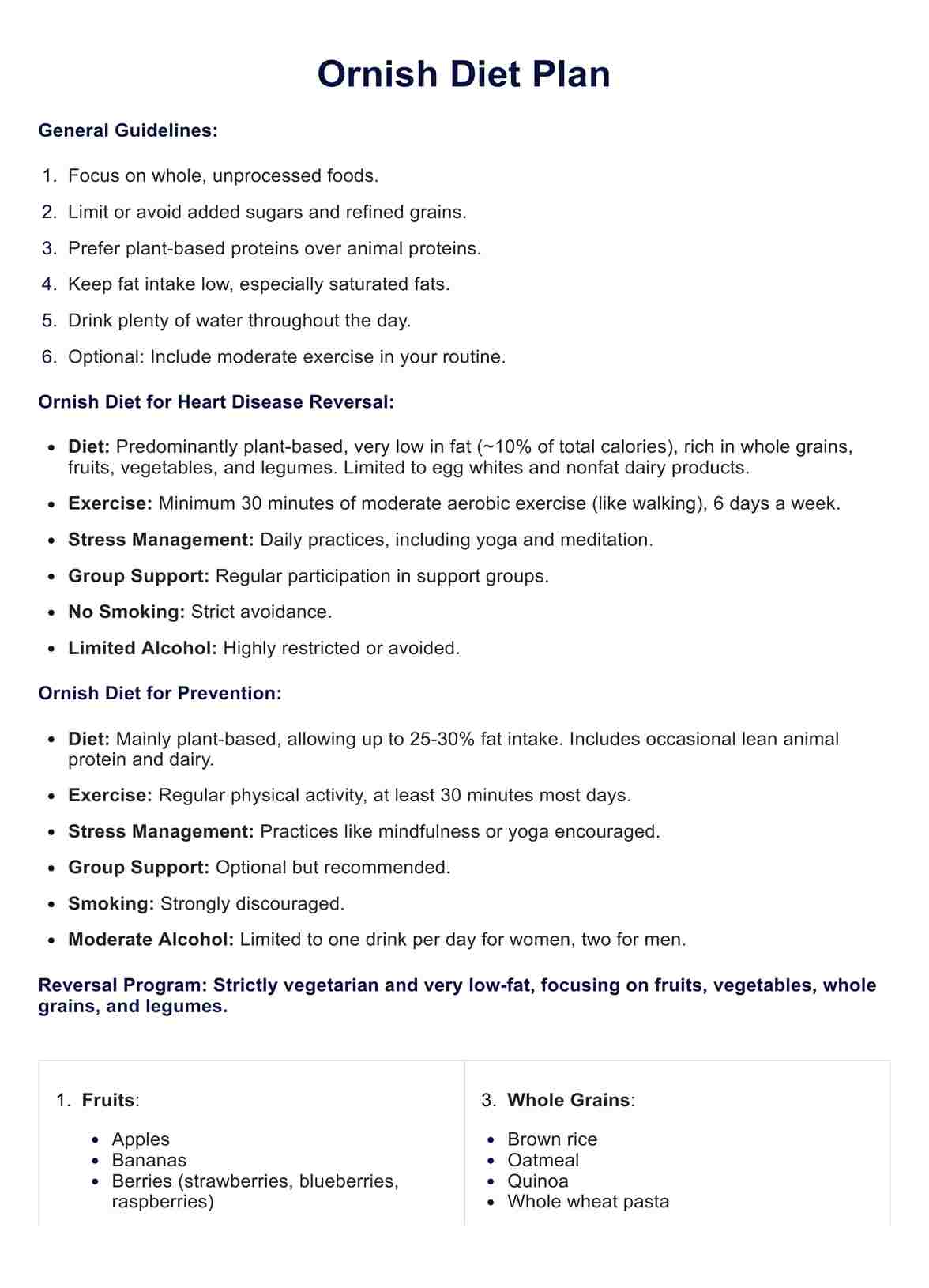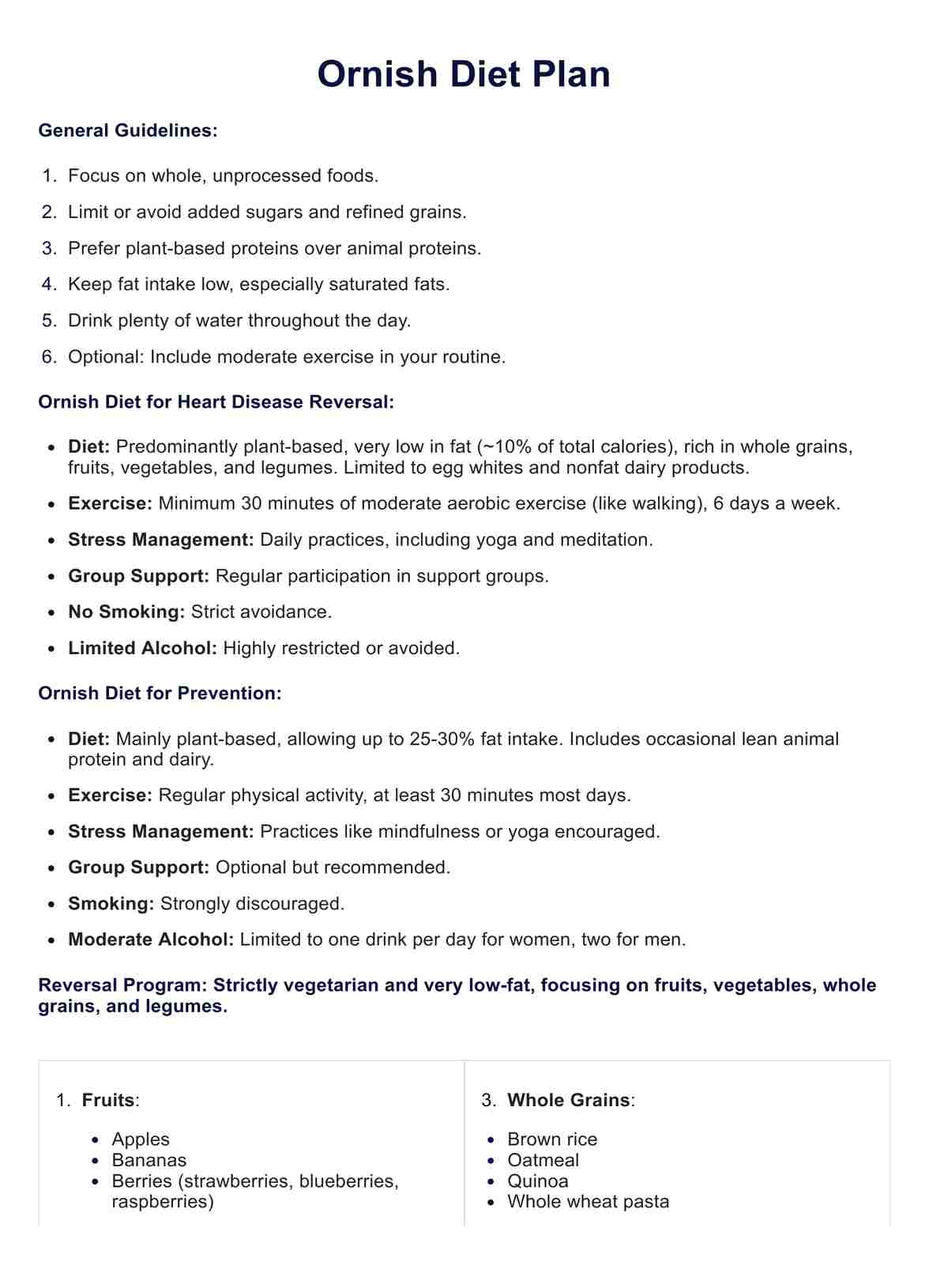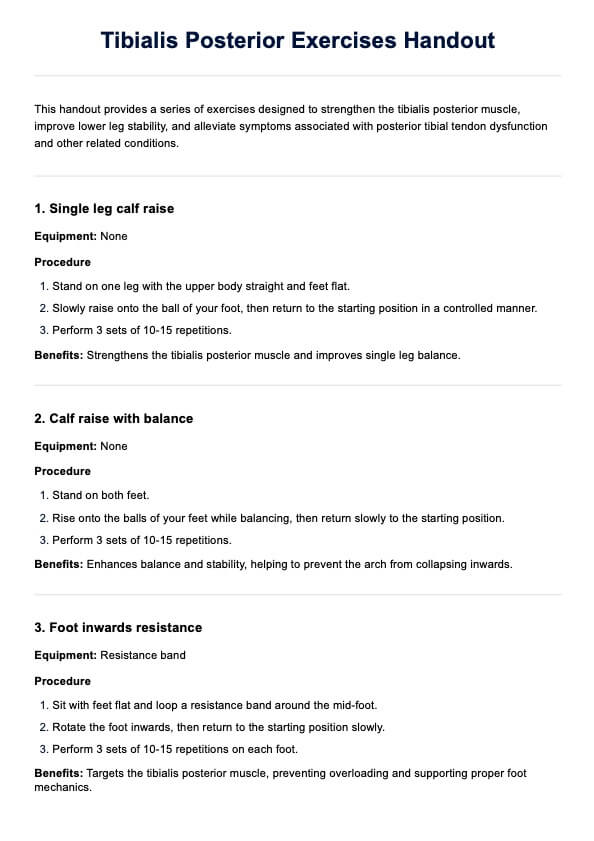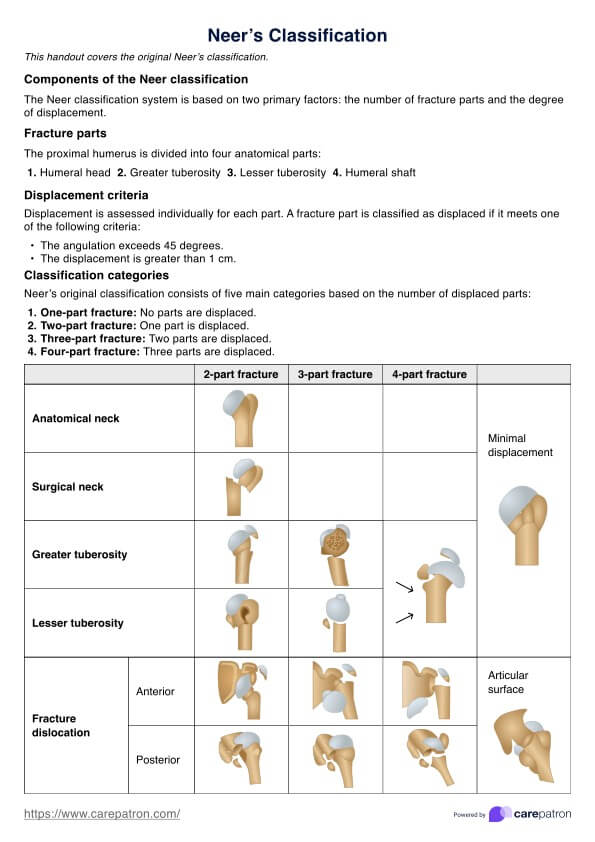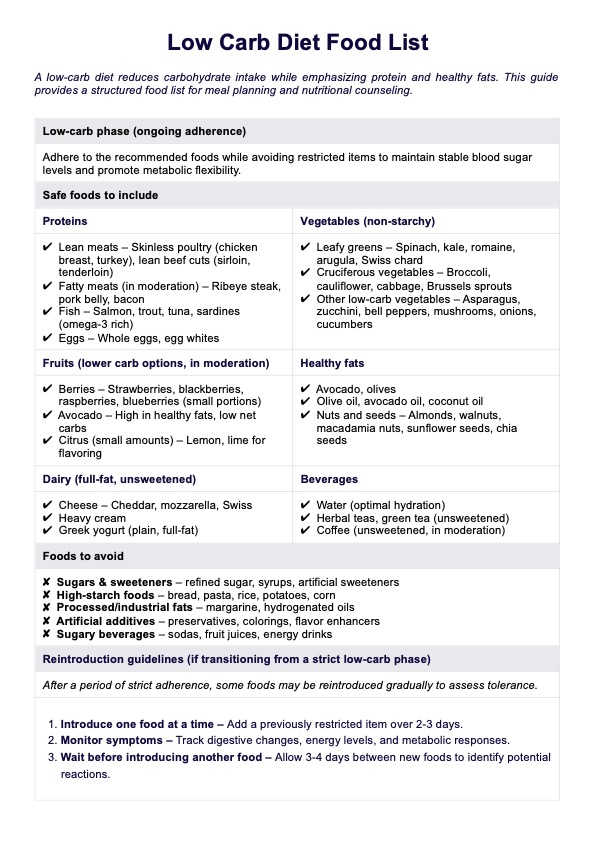Ornish Diet Plan
Discover a structured guide for a heart-healthy lifestyle featuring a detailed schedule of whole grains, fruits, vegetables, and more for optimal wellness.


What is an Ornish diet?
The Ornish diet, conceptualized by Dr. Dean Ornish, is a comprehensive lifestyle strategy that's part of Ornish lifestyle medicine known for being able to prevent and reverse heart disease and potentially other chronic diseases. This approach is structured into two distinct programs: the "reversal" program, which is strictly low-fat and vegetarian, targeting heart disease directly, and the "prevention" program, which is more flexible, incorporating lean animal proteins like fish and chicken, as well as healthy fats from sources such as avocados, nuts, and seeds.
At the heart of the Ornish diet is its focus on whole, plant-based foods. It promotes a diet abundant in fruits, vegetables, whole grains, legumes, and soy products while intentionally minimizing fat intake, particularly saturated fat. Processed foods and animal products are primarily restricted, with limited exceptions like egg whites and nonfat dairy products (like nonfat Greek yogurt). This dietary approach naturally emphasizes complex carbohydrates and plant proteins.
What sets the Ornish diet apart is its all-encompassing approach to health. It transcends mere dietary changes, incorporating elements of diet, stress management, physical activity, and social support. Stress management practices like yoga, meditation, and regular, individualized physical exercise are integral because they can influence physical and mental health. It can even help people lose weight!
We have developed a comprehensive plan to support your commitment to the Ornish diet. This plan is a detailed guide, providing you with the necessary tools to integrate the Ornish diet seamlessly into your lifestyle. It includes meal plans, food lists, shopping lists, and general tips designed to help you realize the long-term health benefits of the Ornish diet.
Ornish Diet Plan Template
Ornish Diet Plan Example
How to use our printable Ornish Diet Plan Template
Our plan comprehensively approaches the Ornish diet's plant-based, low-fat foods. To help you effectively utilize this tool, here's a detailed step-by-step guide on how to use our Printable Ornish Diet Food List.
Step 1: Download the printable Ornish Diet Food Plan Template
Access the Ornish Diet Plan Template by clicking the link on our page above. The list will open in your default PDF reader and be ready for digital use. If you prefer a physical copy, print it out for manual reference.
Step 2: Familiarize yourself with the food categories
Do note that we also have an Ornish Diet Food List that you can refer to. This will provide you with a comprehensive list of the important food categories you need to take note for this diet, along with various examples of what you can buy that belong to each group.
Review the list to understand the food categories of the Ornish diet, such as whole grains, fruits, vegetables, and plant-based proteins. Note the variety of recommended low-fat, nutrient-rich foods, focusing on whole, unprocessed options.
Step 3: Plan your meals
Use the food categories to plan your daily meals. Aim to create Ornish diet recipes and meals that align with the Ornish diet's principles, emphasizing plant-based ingredients and low-fat content while ensuring nutritional completeness.
Step 4: Create a shopping list
Based on your meal planning, draft a shopping list. Use the Ornish Diet Food List we linked earlier to identify and highlight the necessary items, making grocery shopping more efficient and diet-compliant.
The Ornish Diet Plan provides a comprehensive approach to heart health and overall wellness, advocating for a low-fat, plant-based diet. Our Ornish Diet Plan Template PDF provides an in-depth guide, but here's a snapshot of what it entails:
- Fruits: The diet encourages a wide variety of whole fruits such as apples, bananas, berries, and oranges. These fruits, abundant in natural sugars and fiber, are excellent for blood sugar regulation and offer essential vitamins.
- Vegetables: A diverse selection of vegetables, including nutrient-rich options like broccoli, spinach, carrots, and bell peppers, is central to the diet. These vegetables provide vital nutrients and fiber, which benefit overall health.
- Whole grains: Whole grains like brown rice, quinoa, and whole wheat products are integral to the plan. They are essential for sustained energy levels and help maintain a feeling of fullness.
- Legumes and soy products: Plant-based proteins, such as beans, lentils, and tofu, are vital. They offer not only protein but also fiber and various essential nutrients.
- Non-fat dairy: The diet includes low-fat or non-fat dairy options, including nonfat milk and yogurt. These provide necessary protein and calcium while keeping fat content minimal.
- Egg whites: Egg whites are included for their high-quality protein, omitting the fat found in yolks.
- Healthy fats (moderation in prevention program): In the prevention program, healthy fats from sources like avocados and flaxseeds are limited, balancing the diet with essential fatty acids.
When and why would a person shift to this diet?
The Ornish diet is primarily used for its potential to improve heart health, notably in efforts to counteract and prevent heart disease. However, its scope extends to various health and wellness areas, making it a valuable tool for practitioners and individuals focused on holistic health management.
- Cardiovascular health: Primarily associated with cardiovascular health, the Ornish diet, with its low-fat, plant-based composition, may contribute to improvements in heart health. It is often considered by practitioners, especially in cardiology, and for individuals at higher risk of heart disease as part of a more extensive treatment strategy.
- Weight management: The diet's emphasis on whole, nutrient-rich foods aligns it with weight loss and management goals. Nutrition experts, including dietitians, might refer to the Ornish Diet Food List for clients pursuing lasting weight management solutions.
- Diabetes management: Its focus on whole grains, legumes, and fruits aligns with strategies that aim to stabilize blood sugar levels. Endocrinologists and diabetes educators might incorporate this diet aspect in their guidance for patients seeking natural blood sugar control.
- Overall wellness and longevity: The Ornish diet also encourages well-being and longevity through nutrient-dense, low-calorie foods. It may suit those aiming to enhance their general health and prevent chronic conditions. Wellness coaches and holistic health practitioners often recommend the Ornish diet.
While the Ornish diet is often linked to heart health, its principles may be relevant for professionals addressing various health concerns, from cardiovascular diseases and weight management to diabetes control and overall wellness.
What else to keep in mind
When adopting the Ornish diet, it's essential to consider several factors to maximize its potential benefits for heart health and overall wellness.
Mindful eating habits
- Limit high-fat foods: The diet advises against high-fat foods, especially those high in saturated and trans fats like butter, certain oils, and fatty meats, due to their potential impact on cholesterol and heart health.
- Avoid processed and refined foods: Foods like white flour products, sugary snacks, and processed fast foods are discouraged. They often contain unhealthy fats and sugars, leading to weight gain and blood sugar issues.
- Restrict certain animal products: Minimize intake of high-fat animal products, such as red meat and full-fat dairy, which can elevate cholesterol levels.
Lifestyle considerations
- Regular exercise: Incorporating cardiovascular exercises is critical. Physical activity aids in heart health, weight management, and overall fitness.
- Stress management: Practices like yoga, meditation, and deep breathing are recommended for effective stress management, crucial for heart and emotional well-being.
- Emotional support: Engaging in group therapy, community groups, or leaning on family and friends for support is essential for sustaining lifestyle changes and managing emotional eating.
Dietary balance
- Nutrient diversity: Ensure a balanced nutrient intake, particularly in a plant-based diet, by including various fruits, vegetables, whole grains, and legumes.
Professional guidance
- Healthcare consultation: Regular check-ups and personalized advice from healthcare professionals are essential to monitor the diet's impact on your health.
This holistic approach combines nutrition, physical activity, stress reduction, and emotional support, aiming not just at dietary changes but an enhanced quality of life.
Research and evidence
The Ornish diet, founded on the groundbreaking work of Dr. Dean Ornish, has garnered widespread recognition for its potential to enhance heart health. Central to its acclaim is a pioneering study by Ornish et al. in 1998, a small randomized trial, which introduced the notion that an ultra-low fat vegetarian diet might substantially benefit cardiovascular health.
Follow-up research led by Dr. Ornish further reinforced this idea, demonstrating notable improvements in cardiovascular disease markers among those who followed his dietary and lifestyle recommendations (Ornish et al., 1990). However, it's essential to understand that these encouraging findings are part of a continuing investigation into the relationship between diet and heart health and should be viewed within the context of ongoing scientific inquiry.
The principles of the Ornish diet share similarities with other low- or no-meat diets often advocated for heart health. Its emphasis on plant-based foods and minimal fat consumption aligns with "heart-healthy" diets, which recommend reducing saturated fats and cholesterol typically found in animal products (Hever, 2016).
In terms of weight loss, the Ornish diet has shown promise. Research indicates short-term weight loss of about 3.2% after six months of adherence (Parmar, 2023). The diet's focus on unprocessed, plant-based foods and low-fat intake mirrors strategies known to be effective in weight management. However, the rigorous nature of its guidelines may pose challenges for some regarding long-term adherence and sustainability.
Beyond diet alone, the Ornish diet advocates a comprehensive approach to health, integrating crucial aspects such as regular exercise, sufficient sleep, and stress management (Ornish et al., 1990). It's a holistic regimen that goes beyond mere nutritional recommendations to embrace a broad spectrum of lifestyle factors essential for overall well-being.
The Ornish diet, grounded in robust fundamental concepts, offers a comprehensive path to health and can significantly enhance long-term wellness if adapted to individual preferences and needs.
References
Hever J. (2016). Plant-Based Diets: A Physician's Guide. The Permanente Journal, 20(3), 15–082. https://doi.org/10.7812/TPP/15-082
Ornish, D., Scherwitz, L. W., Billings, J. H., Brown, S. E., Gould, K. L., Merritt, T. A., Sparler, S., Armstrong, W. T., Ports, T. A., Kirkeeide, R. L., Hogeboom, C., & Brand, R. J. (1998). Intensive lifestyle changes for reversal of coronary heart disease. JAMA, 280(23), 2001–2007. https://doi.org/10.1001/jama.280.23.2001
Ornish, D., Brown, S. E., Scherwitz, L. W., Billings, J. H., Armstrong, W. T., Ports, T. A., McLanahan, S. M., Kirkeeide, R. L., Brand, R. J., & Gould, K. L. (1990). Can lifestyle changes reverse coronary heart disease? The Lifestyle Heart Trial. Lancet (London, England), 336(8708), 129–133. https://doi.org/10.1016/0140-6736(90)91656-u
Parmar, R. M., & Can, A. S. (2023). Dietary Approaches to Obesity Treatment. In StatPearls. StatPearls Publishing. https://www.ncbi.nlm.nih.gov/books/NBK574576/
Commonly asked questions
The Ornish diet is a nutritional and lifestyle plan developed by Dr. Dean Ornish. It's primarily plant-based, emphasizing the consumption of whole grains, fruits, vegetables, and legumes while limiting the intake of fats, particularly saturated and trans fats.
The diet is known for its focus on heart health, but it also encompasses holistic lifestyle changes, including regular exercise, stress management techniques like meditation and yoga, and the importance of emotional support and community.
Yes, the Ornish diet can be effective for weight loss. Its focus on nutrient-rich, low-fat, and whole foods can help reduce calorie intake while providing essential nutrients. The diet's emphasis on regular physical activity and stress management can also contribute to a healthy weight loss journey. However, individual results can vary, and it's important to approach weight loss as part of an overall lifestyle change.
The Ornish diet, emphasizing whole grains, legumes, and fruits, can be suitable for people with diabetes as it focuses on foods that help regulate blood sugar levels. However, individuals with diabetes must consult their healthcare provider before making significant dietary changes, as individual nutritional needs and diet responses can vary.


